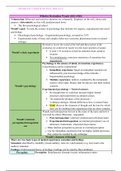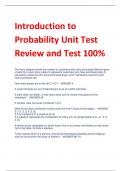PROBLEM 3. BIRTH OF PSYCHOLOGY 1
Wilhelm Maximilian Wundt (1832-1920)
Voluntarism: Behaviors and selective attention are voluntarily. Emphasis on the will, choice and
purpose. (determinist, no free will, predetermined laws)
The first psychological school
Wundt’s goal: To crate the science of psychology that includes two aspects, experimental and social
psychology.
Physiological psychology = Experimental psychology, invented in 1879
Experimental study of basic and complex behaviors-conscious phenomena (more in natural
settings)
He tried to locate the sound of the bell and the position of the
pendulum, he could never locate it to the exact position of sound.
It took 1/10 second to switch his attention from sound to
Wundt’s clock experiment
location.
Not simultaneous conscious experience of sensations but
successively
Psychology is the science of mind, of conscious experiences.
Consciousness can be experienced:
1. Immediate experience: based on immediate reactions not
influenced by previous knowledge of the stimulus. >
Experimental psychology
2. Mediate experience: indirect, mediated by the instruments
used to collect data. Mainly data for physics and other neutral
Wundt’s psychology sciences.
Experimental psychology = Neutral sciences
He thought that we could not measure higher mental
processes and treated them as cultural science.
He studied the products of the processes >
Volkerpsychologie. Mental differences have a cultural basis
Goal: discover the elements of thought and the laws by which
they can be combined into experiences that are more complex.
Wundt used introspection but not in the sense of the term and how it
was used by others (Descartes, Augustine)
1. Pure introspection: relatively unstructured self-observation
Wundt’s internal
2. Experimental introspection (or internal perception): use of
perception-Introspection
laboratory instruments, structured observations.
use
→ Make internal perception as precise as external perception
→ Use for immediate experiences but not higher mental processes,
they cannot be reached by any technique.
Wundt’s elements of thought
There are two basic types of mental experiences sensation and feelings
Sensation: described by modality (visual auditory, taste etc.) and intensity (e.g. how loud is the
auditory stimulus)
Feelings: tridimensional theory of feelings. Feelings can be rated by three attributes
Perception Perception: Simultaneous elements (sesory information) enters
, PROBLEM 3. BIRTH OF PSYCHOLOGY 2
consciousness > occurrence of perception
Perception is passive, determined by stimuli, physiology and past
experiences.
Apperception: Sensory impression, the part of perceptual field that the
person attends. What is attended is apperceived.
Active and voluntary, under individuals control (differential point to
empiricists)
Apperception Perceived vs Apperceived ideas:
Creative synthesis Automatical and mechanical ideas of perception VS creative
synthesis of ideas at the focus of attention that takes place in frontal
lobes.
→ Experiment of apperception, 4-6 numbers, familiar words (as
a whole like Cattel proposed)
→ Vital for normal mental processes, Emil Kraeplin –
dementia praecox, abnormal behavior because of flaws in
central processes like attention, scanning etc.
Every feeling belongs to at least one of these dimensions
1. Pleasurable-Unpleasurable
2. Arousing-Subduing (exciting-depressing)
Feelings 3. Strain-Relaxation
Recent research, factor analysis, similar dimensional models
Schlosberg: pleasantness, activation, attention
Tannenbaum: good, active, strong
Based on Donder’s choice reaction time testing (discrimination tests or
multiple stimuli test) > mental chronometry, times of mental acts.
That method helps experimental investigation of the mind.
Abandoned it due to large variation across settings and individuals
Reaction times
Many other variables had an influence (modality, number of items,
practice of subject)
Apperception takes 0.1 second longer, when2222 concentrating on the
stimuli and not just engaging in perception that has a quick response.
Wundt’s Psychology Vs Physiology
Physical causation cannot predict psychological events and vice versa.
Principle of heterogeneity of ends: Goal directed activity; unexpected event changes the
motivational pattern.
Principle of contrasts: Opposite experiences, intensify one another e.g eating sth sour makes sweet
taste sweeter.
Principle towards the development of opposite: Increased tendency to seek opposite experiences.
Wilhelm Maximilian Wundt (1832-1920)
Voluntarism: Behaviors and selective attention are voluntarily. Emphasis on the will, choice and
purpose. (determinist, no free will, predetermined laws)
The first psychological school
Wundt’s goal: To crate the science of psychology that includes two aspects, experimental and social
psychology.
Physiological psychology = Experimental psychology, invented in 1879
Experimental study of basic and complex behaviors-conscious phenomena (more in natural
settings)
He tried to locate the sound of the bell and the position of the
pendulum, he could never locate it to the exact position of sound.
It took 1/10 second to switch his attention from sound to
Wundt’s clock experiment
location.
Not simultaneous conscious experience of sensations but
successively
Psychology is the science of mind, of conscious experiences.
Consciousness can be experienced:
1. Immediate experience: based on immediate reactions not
influenced by previous knowledge of the stimulus. >
Experimental psychology
2. Mediate experience: indirect, mediated by the instruments
used to collect data. Mainly data for physics and other neutral
Wundt’s psychology sciences.
Experimental psychology = Neutral sciences
He thought that we could not measure higher mental
processes and treated them as cultural science.
He studied the products of the processes >
Volkerpsychologie. Mental differences have a cultural basis
Goal: discover the elements of thought and the laws by which
they can be combined into experiences that are more complex.
Wundt used introspection but not in the sense of the term and how it
was used by others (Descartes, Augustine)
1. Pure introspection: relatively unstructured self-observation
Wundt’s internal
2. Experimental introspection (or internal perception): use of
perception-Introspection
laboratory instruments, structured observations.
use
→ Make internal perception as precise as external perception
→ Use for immediate experiences but not higher mental processes,
they cannot be reached by any technique.
Wundt’s elements of thought
There are two basic types of mental experiences sensation and feelings
Sensation: described by modality (visual auditory, taste etc.) and intensity (e.g. how loud is the
auditory stimulus)
Feelings: tridimensional theory of feelings. Feelings can be rated by three attributes
Perception Perception: Simultaneous elements (sesory information) enters
, PROBLEM 3. BIRTH OF PSYCHOLOGY 2
consciousness > occurrence of perception
Perception is passive, determined by stimuli, physiology and past
experiences.
Apperception: Sensory impression, the part of perceptual field that the
person attends. What is attended is apperceived.
Active and voluntary, under individuals control (differential point to
empiricists)
Apperception Perceived vs Apperceived ideas:
Creative synthesis Automatical and mechanical ideas of perception VS creative
synthesis of ideas at the focus of attention that takes place in frontal
lobes.
→ Experiment of apperception, 4-6 numbers, familiar words (as
a whole like Cattel proposed)
→ Vital for normal mental processes, Emil Kraeplin –
dementia praecox, abnormal behavior because of flaws in
central processes like attention, scanning etc.
Every feeling belongs to at least one of these dimensions
1. Pleasurable-Unpleasurable
2. Arousing-Subduing (exciting-depressing)
Feelings 3. Strain-Relaxation
Recent research, factor analysis, similar dimensional models
Schlosberg: pleasantness, activation, attention
Tannenbaum: good, active, strong
Based on Donder’s choice reaction time testing (discrimination tests or
multiple stimuli test) > mental chronometry, times of mental acts.
That method helps experimental investigation of the mind.
Abandoned it due to large variation across settings and individuals
Reaction times
Many other variables had an influence (modality, number of items,
practice of subject)
Apperception takes 0.1 second longer, when2222 concentrating on the
stimuli and not just engaging in perception that has a quick response.
Wundt’s Psychology Vs Physiology
Physical causation cannot predict psychological events and vice versa.
Principle of heterogeneity of ends: Goal directed activity; unexpected event changes the
motivational pattern.
Principle of contrasts: Opposite experiences, intensify one another e.g eating sth sour makes sweet
taste sweeter.
Principle towards the development of opposite: Increased tendency to seek opposite experiences.






